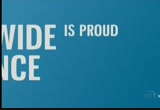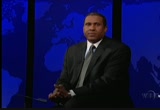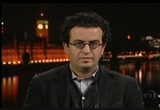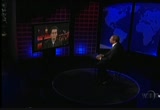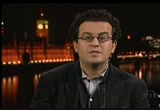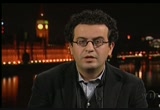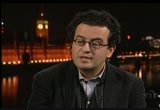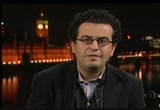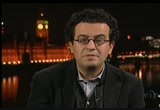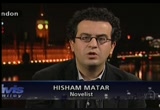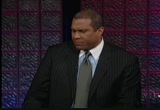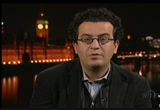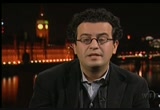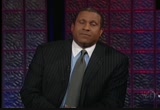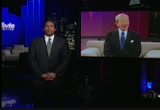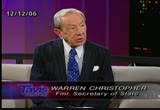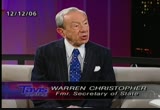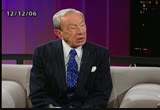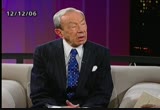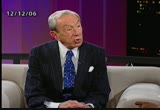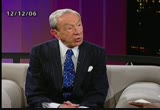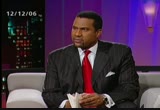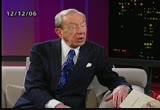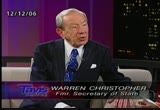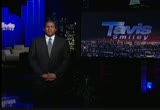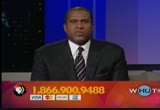tv Tavis Smiley WHUT March 22, 2011 7:00pm-7:30pm EDT
7:00 pm
tavis: good evening. from los angeles, i am tavis smiley. the news that libyan leader moammar gaddafi can be digging in. first tonight, a conversation with an outspoken critic of the gaddafi regime, hisham matar. his family are fighting on the side of the anti-gaddafi forces. talking about what this moment means for libya and the world. also tonight, we remember the life and legacy of former secretary warren christopher. there is the subject of diplomacy. the u.s. is now engaged in three wars in three different muslim
7:01 pm
countries. the issue of diplomacy has never been more critical, it seems. we are glad you are joining us, including a look back at our interview with warren christopher, right now. >> all i know is his name is james, and he needs extra help with his reading. >> i am james. >> yes. >> to everyone making a difference -- >> thank y. >> you help us all live better. >> nationwide insurance supports tavis smiley. with every question and every answer, nationwide insurance is proud to join tavis in working to improve financial literacy and remove obstacles to economic empowerment, one nationwide is on your side. >> and by contributions to your pbs station from viewers like you. thank you. kcet public television]
7:02 pm
tavis: a few programming notes. tomorrow night on the program, we will take a look at the relief and recovery operations in japan with architect hitoshi abe and a conversation with known play right eve ensler. later this week, a co-founder of twitter, biz stone, a social networking site that is one of the most used in the world. an acclaimed artist will be with us later this week against the backdrop of the arab-israeli conflict on the middle east, and by friday, i will be joined by t.c. boyle and ray lewis. and my interview that was scheduled to be tonight will now be next monday. the former "cheers" is out with
7:03 pm
a book. that is ted danson next monday. we begin with news out of libya. hisham matar has many members of his family who are now fighting alongside rebels in the hopes of ousting gaddafi. he is the author of the notable book about life there, called "in the country of men," and he will be out with a new book coming out, "anatomy of a disappearance." good to have you. >> it is nice being here. tavis: tell us more of that your family's relationship with the gaddafi regime. >> my father was a dissident, and we live in cairo in exile in the 1990's. he was kidnapped by the egyptian secret service.
7:04 pm
police, who then handed him over to the libyan secret service. the police then flew him to libya. he was imprisoned without trial. he was tortured. and he disappeared. many libyan political prisoners prisonithin khaddafi's system, so we do not really know if he is a live or dead. we do not know his fate. that is the history. tavis: so the last time you spoke or saw your father was when? >> i saw him in 1990. he was taken in march 1990, and i saw him a couple of months before then because i was studying abroad, in england. tavis: let me start by asking you what you make of the normalized relations that this country, the u.s., has had with gaddafi over all of these years.
7:05 pm
i ask you that because it is fascinating that president and others want to refer to him as "a tyrant," as if he became a tyrant overnight, a country that we are bombing now by day and by night. >> in short, i think it is scandalous. more importantly than that, we can look at it more in detail, so the argument was this. the argument was by becoming friends with gaddafi, by giving gaddafi international legitimacy, the united states and the eu, the european union, where securing two things, and those were -- that is how it was sold, and the two things were that they were making gaddafi less dangerous, and therefore, the world would be safer, and secondly, they were making
7:06 pm
gaddafi more likely to engage in reform, and therefore, he would be less able to be paid with the same level of impunity that he was using it against his people -- he would be less able to behave with the same level of impunity. there are people who sincerely believe this was true, so what i think is more worried than just saying, well, this is a defense argument, which it was, -- a defunct argument, which it was, butt pays us to look at the details at how it was sold, and the way it was sold is that there were some very specific pr companies based in new york and in london who actually still seem to be in the pay of the gaddafi regime, who engaged in a
7:07 pm
very complex and sophisticated program to convince europe and the united states. the facts are very different. treating him like a respectable statesman. they have extended the life of this very old dictator and certainly have allowed him to act with even more impunity against his own people, under the claim that any dissident was a terrorist, and it made democracy difficult, and it actually made what the libyans are trying to do now very difficult. in my opinion, it is a disgraceful judgment and at best
7:08 pm
a diplomatic negligence. tavis: so let me ask, having said all of that, what you may then of the u.n. resolution and the military activity that has followed that resolution -- what you make of it. >> i think the libyan people, you have to remember now that other countries are involved. this is very much a libyan revolution. it is a revolution that was started with grass roots, by women and men, by lawyers, by teachers, and it is a revolution that in the early days was completely peaceful. the reason it had to carry-on was because it was treated with absolute brutality. indiscriminate violence. it i very noble and quite
7:09 pm
dm hav admit as a libyan, quite surprising, because many libyans like me have been disheartened, wondering whether a 41-year-old dictatorship has not managed that beautiful thing in the human spirit that calls for the light, that calls for justice, that calls for accountability and dignity. this revolution comes as a complete and unequivocal answer to these doubts of mine, which i have shared with many other people, that they did this. we have to remember, now that other countries are involved in these conflicts, --
7:10 pm
tavis: those on the ground may be appreciative, but there is always a line where you can stay too long, tried to do too much. where is that line? >> yes, i think we have to be informed by history, and the history is that libya is a sensitive country to colonialism, because it had a terrible experience under fascist italy. the mussolini campaign to take libya in the early 1900's was a savage one and one that shamefully many people do not know about. mussolini and his army killed almost 50% of the libyan population. half a million people, in order
7:11 pm
to subdue this small, north african country, so libyans are very sensitive to fort intervention. -- to foreign intervention. i am encouraged by the text of the resolution. it is quite nuanced about its mandate. it knows about this. and i think it would do very well to endure by it. >> -- tavis: let me ask you this, mr. matar, about the understanding of what the obama administration wants to do. when the administration says we are only going to be there for a few days, but nobody wants to put a real timetable on that, we were in iraq for just a few days, and we are still there eight days later. i want to be clear about your
7:12 pm
own understanding about what the point is of the u.s. mission. is the point to bomb a few days? to help out the rebels on the ground? is the point to take it gaddafi out? are you clear of the goals, because i am not? >> well, i will not for a moment claim to be speaking for anyone but myself, so i do not know what a military analyst with say about that, but in my humble opinion, it seems that the facts on the ground are that you had a very robust but actually quite amateurish fighting force made up of civilians, people who were not trained to carry arms. i know people in libyans wvefikg small businesses and in some r seca attending univeitsey, in some cases attending school, kids as young as 16, who carried books to school six weeks ago and are now carrying arms, so very high on bravery and
7:13 pm
determination but very low in training and that. particularly when you consider some towns, especially one very close to triple b which has been bombed very heavily, -- derek lowe steve tripoli which has been bombed very heavily -- very close to tripoli. i think the bravery of the men and women there is almost mythic. yet, the dictatorship has counted them night after night, and they still have not managed to take control. with that sort of scenario on the ground, you think, well, the resistance is moving and has managed to remain strong, but they need some help, and i think the entire community has come in to provide that. now, as you know very well come
7:14 pm
as soon as this a -- as you know very well, as soon as this amount of intervention happens, a reliance on wise and sensible human beings is very high, meaning that it has to be, it has to remain a tempered. it has to remain disciplined, and it has to remain nuanced. tavis: hisham matar stay tuned for being on. we appreciate your insights. -- thank you for being on. up next, a look back at warren christopher. stay with us. longen christopher's service dated back to his time in the navy during world war two. he served in the white house under lyndon johnson and jimmy carter and was appointed as secretary of state. he helped form the l.a. police department after the rodney king
7:15 pm
beating, and there was the al gore case that decided the 2000 election. he was joining us back on this program back in 2006, and there was much debate at the time about the lack of diplomacy around the world and how that impacted u.s. foreign policy. at the time, the u.s. was mired in two wars, and as it would have it, the u.s. is engaged in another muslim country. before we go into the conversation of diplomacy, i begin by noting one of his well-worn trademarks, a pin- striped suit. i went up and step up my game, got me a nice pin-striped suit, because i knew you would have to do it. i do not care what george shultz says. all right. seriously though, i wanted to have you on, because as i was saying before we went on the air, you have such a wealth of
7:16 pm
information, wealth of knowledge to share about diplomacy, and i wanted to have you on because that seems to be a word that has been forgotten in washington these days, and i thought we could sit for a few days and talk about diplomacy. that is it. thank you for accepting my invitation. let me start with asking you whether or not you agree with that. what it means to engage in diplomacy. >> yes, the last several years, our sense of superiority, even arrogance, has caused us to think we do not even need to engage the countries that our adversaries, and i think that is a very serious mistake, that the iraqi commission pointed out. we need to talk to countries like iran and syria. if we do not do this, we tend to isolate ourselves. we think we are isolating them, but we are isolating ourselves. just look at iran and syria. they are on either side of iraq.
7:17 pm
a very, very difficult struggle, and we are not talking to their neighbors. tavis: and yet, all of the distinguished persons on the iraq steady group, and i am told that they talked to you, on that commission -- on the iraq study group, the first thing that was said eventually it was not talking to iran and syria. >> i hope he will change his mind on that. that is one thing about presidents. they can tomorrow change their minds. i hope they can find some way to talk to iran and syria, because i think it is very important to get a solution to this problem. tavis: what is the value in trying to advance the value of peace or whatever the object would be, what would be the object of icing someone, of not talking to them? >> i think president bush says
7:18 pm
we will not talk to them unless they make a concession on a basic issue, and that seems to be going against human nature, but that is going on all around the world. for example, he has declined to talk face-to-face, one on one, with the iranians until they agree not to have a nuclear program. you have to start a conversation with the other country involved, and then you find a way to a conclusion. ms. khyber, this the administration thinks the power of the united states -- misguidedly, this administration thinks the power of the united states does not have to do that. tavis: i am trying to figure out how to phrase this delicately. we talked about this issue of public diplomacy, and i define public diplomacy as, where we are concerned, as americans having to sell or explain america to the rest of the world
7:19 pm
in a way that they get and understand. if we take that definition, one could argue, given your point, that mr. bush is not cut out for public diplomacy, that at a point where we need to be engaged in the world right about now, given the mess that we are in, this is not the guy to put out in front as our diplomat in chief. >> i do not want to criticize the president, but i think this is very important, and i think he needs to convey the attitude to this administration that we need to be talking to the other countries. otherwise, we are not going to get to where we want to get. tavis, the real way to engage them is to talk about what their interests are, not what their positions are. sometimes, their positions are totally unacceptable to us, but if you understand what would be good for them, then you can get closer to home. tavis: what would be hypothetical be saying to a country like iran or syria, if
7:20 pm
the president were, to your point, to change on a dime and begin talking to them? >> to avoid chaos, a void a meltdown in iraq, -- of what a meltdown. and why is that? -- avoid a meltdown. this comes from civil wars. already, it is estimated that 1 million people have left iraq for jordan, and 1 million people have gone to syria. you have to visualize it. a relatively small country, like both of those are, that amount is just an enormous burden, and there are so many things that you could talk to those two countries about their interests, why is in their interests to have a reconciliation within iraq, and why it is not in their interests to have this war spill over into their borders. tavis: is it possible to get to
7:21 pm
a point where your credibility in the world community, the situation gets so ugly, nasty, so violent that to move beyond the point of diplomacy being able to work? >> i suppose it is possible. we are not there yet with either of those countries. i have dealt a lot with syria, and i have dealt a lot with iran at a distance. let me tell you some of the things i think we should do with a country like syria. tavis: please. diplomacy is about this, like real estate is about location, location, location. i would send somebody to talk to their foreign minister, unofficially. there are a few that we have worked with. i would also send somebody to talk to their ambassador to the united states, unofficially and quietly. i would see if there are some
7:22 pm
contacts, military, and i would see if there would be some intelligence contacts. sometimes, there are contacts like that that would surprise you. having these around the edges of the conversation, rather than saying, "ahmadinejad, i want to talk to you," or the president of syria, i would work around it and find out what would be necessary to start this conversation on a positive basis. tavis: president jimmy carter was on the program, talking about palestine, apartheid, a book, and we talked about this last night, and increasingly, we live in a world where it seems that even though we are in love with this thing called democracy that we want to export around the world, there are people that are democratically elected thatwe have an issue talking to, people like hamas or hizbollah, that are being
7:23 pm
democratically elected. they get democratically elected, but we do not want to talk to them. >> one thing i would say about that, democracy is more than just having an election. quite often, we tried to impose our democratic ideals on the country that is not really ready for it. they do not have what is necessary. they do not have other things, like a free press or a portis system, so if you try to define democracy as just having an election, then you are probably trying to go faster than you should -- like a free press or a port system. they're a very few people that we should not be able to engage in conversation, especially if they are a state. we might make an exception for non state actors. remember, the united nations. all of these countries have ambassadors in the united nations. i think a careful approach to the united nations ambassadors
7:24 pm
would be a good way also to begin dialogue. tavis: how do you do that if you do not have a good god for the institution? -- a good regard for the institution? i was fascinated by this book. a powerful book that you put out that includes some of your speeches and some of a believes at how to be effected at diplomacy. tell me about this case -- some of your beliefs at how to be effected at diplomacy. >> i had written some things, and i wanted to collect it in some place. this is quite an eclectic selection, as you can probably see. how to solve american foreign policy. i guess i wro it for my children so they can see what i was thinking about in this part of my life. tavis: i obviously must be one of your children then, because i
7:25 pm
have been reading it with great interest. sitting down for a conversation on television or radio, but i am honored to have you come on this show. i am glad to have you here, mr. christopher. upon his passing, it was said that he has the lowest ratio of ego to accomplishment of anyone i have worked with. he age of 85.angeles on friday that is our show for tonight. as always, keep the faith. >> for more information on today's show, visit tavis smiley at pbs.org. tavis: hi, i am tavis smiley. join me next time. we will have a look at relief efforts in japan, plus an acclaimed play right, eve that is next time.
7:26 pm
we will see you then. >> all i know is his name is james, and he needs extr help with his reading. >> i am james. >> yes. >> to everyone making a difference -- >> thank you. >> you help us all live better. >> nationwide insurance supports tavis smiley. with every question and every answer, nationwide insurance is proud to join tavis in working to improve financial literacy and remove obstacles of economict e aim t asationt a a . ti >> and by contributions to your pbs station from viewers like you. thank you. [captioning made possible by kcet public television] captioned by the national captioning institute --www.ncicap.org- >> be more. pbs. >> be more. pbs.
154 Views
IN COLLECTIONS
WHUT (Howard University Television) Television Archive
Television Archive  Television Archive News Search Service
Television Archive News Search Service 
Uploaded by TV Archive on

 Live Music Archive
Live Music Archive Librivox Free Audio
Librivox Free Audio Metropolitan Museum
Metropolitan Museum Cleveland Museum of Art
Cleveland Museum of Art Internet Arcade
Internet Arcade Console Living Room
Console Living Room Books to Borrow
Books to Borrow Open Library
Open Library TV News
TV News Understanding 9/11
Understanding 9/11
